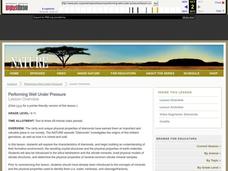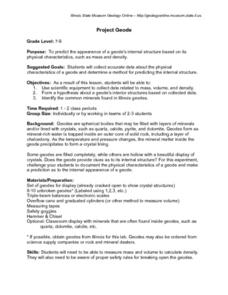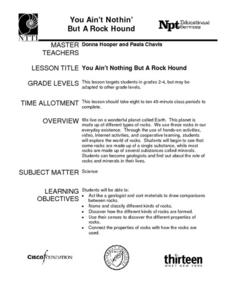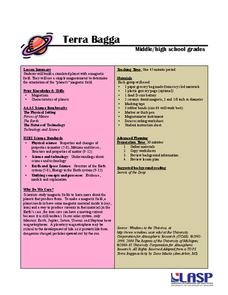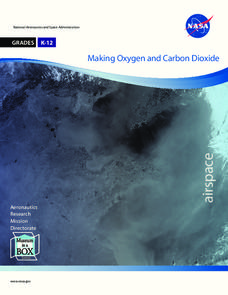Curated OER
Chemistry Review
In this chemistry review worksheet, students read about atoms and the periodic table and they complete a chart using the periodic table to find the atomic number, atomic mass and group of given elements. Students answer 5 questions about...
Curated OER
Performing Well Under Pressure
Students study the physical properties of minerals and illustrate their functions. In this mineral lesson students construct models of some minerals.
Curated OER
What Influences Reaction Rate?
Students study reaction rates, what determines how fast a reaction happens and how the chemical changes occur. In this reactions lesson students complete a lab where they use Alka-Seltzer to observe reaction rate and create a graph...
Curated OER
Mystery Minerals
Students minerals and how they form. They investigate the classification of minerals according to physical properties. Students watch a video about mineral characteristics. In groups, students participate in hands-on activities and...
Curated OER
Chemistry Module
Students build metal atomic models using styrofoam. In this chemistry lesson, students identify the different unique properties of metals. They explain how metal atoms bond.
Curated OER
Determining the Density of a Liquid
Students find the density of diet soda and regular soda. In this density lesson plan, students measure the mass of a graduated cylinder with 10 different volumes of each soda. They find the mass of the liquid alone and use the volume to...
Curated OER
Particulate Matter: How Dirty is the Air We Breathe?
Fourth graders create a simple testing device and collect and observe the pollution in the air we breathe.
Curated OER
Project Geode
Young geologists attempt to predict the appearnace of a geode's internal structure based on how it looks from the outside, its mass, and its physical characteristics. For this geologly lesson, learners use scientific equipment to collect...
Curated OER
You Ain't Nothin' But a Rock Hound
Here is an excellent lesson on rocks! In it, learners explore the world of rocks through the use of video, hands-on activities, and cooperative projects. This outstanding plan is chock full of terrific activities, websites, streamed...
Curated OER
Super Shapes Part 2 - Circles
Through the use of Internet, video, and hands-on activities, youngsters learn the parts and characteristics of a circle. This fantastic lesson has some excellent website activities included in the plan. Your kids will have a much greater...
Curated OER
Revolution in Russia
As an overview of the Russian Revolution, this presentation provides a well-thought-out and comprehensive look at this subject. The outlines, questions, and other information provide a high-level look at WWI and the Russian Revolution....
Curated OER
Polymer Chemistry: More than Just Plastic
Fifth graders examine polymers and how they are formed. In this chemistry lesson plan students complete their own polymer experiment then discuss what they learned.
Santa Monica College
The Density of Liquids and Solids
There are underwater rivers that flow on the ocean floor thanks to a difference in density. Scholars learn about the density in both liquids and solids in the second activity of an 11-part series. They then determine the density of...
Virginia Department of Education
Thermochemistry: Heat and Chemical Changes
What makes particles attract? Here, learners engage in multiple activities that fully describe colligative properties and allow the ability to critically assess the importance of these properties in daily life. Young chemists...
Cornell University
Bacteria Take Over and Down
Bacteria outnumber all other forms of life on Earth. Scholars observe the growth of bacteria in petri dishes to understand their role in maintaining good health. Then, they observe the growth of bacteria after they introduce...
Beyond Benign
Puzzler
Are some packaging materials superior to others? Using sustainability as a guide, scholars analyze different packing materials to describe their life cycles. They create puzzles to communicate their findings.
University of Colorado
Terra Bagga
Earth's magnetic poles switch positions about every 200,000—300,000 years. In the activity, groups create a planet with a magnetic field. Once made, they use a magnetometer to determine the orientation of the planet's magnetic field....
University of Colorado
Terra Bagga
One way to identify possible volcanic activity on other planets is by testing the planet for magnetism. A science lesson begins with pupils constructing their own planet from a dead battery, magnets, paper, and tape before labeling...
Curated OER
No Shadow of Doubt
Fifth graders must use a pencil to draw in the shadows they think will be formed by a house, a greenhouse, and a tree. The sun is behind each of these objects, and an open field is in front of them. That's where pupils draw their...
Education Outside
Papermaking
Imagine recycling food scraps and using them to make paper. The directions are all here in a seven-page packet that details several paper-making strategies.
Curated OER
Amounts of Dissolved Oxygen in Various Bodies of Water
Students test water to determine the dissolved oxygen content while displaying the proper use of testing instruments while visiting water testing sites. They determine if the amount of dissolved oxygen is appropriate for the tested...
NASA
Making Oxygen and Carbon Dioxide
Some like it hot! Scholars observe both exothermic and endothermic reactions as part of the carbon dioxide oxygen cycle. First, scientists demonstrate (or watch) a chemical reaction to create pure oxygen using fire for...
University of Colorado
Looking Inside Planets
Researchers use scientific data to understand what is inside each of the planets. The first in a series of six, this lesson builds off of that concept by having pupils use a data table to create their own scale models of the interiors of...
Agency for Toxic Substances and Disease Registry
Don't Mess with Mercury (Lesson B)
At one point, people thought mercury was therapeutic for humans, but now we know it is highly toxic. The second of three activities covering mercury focuses on its health hazards if humans are exposed. Pairs research and answer questions...



